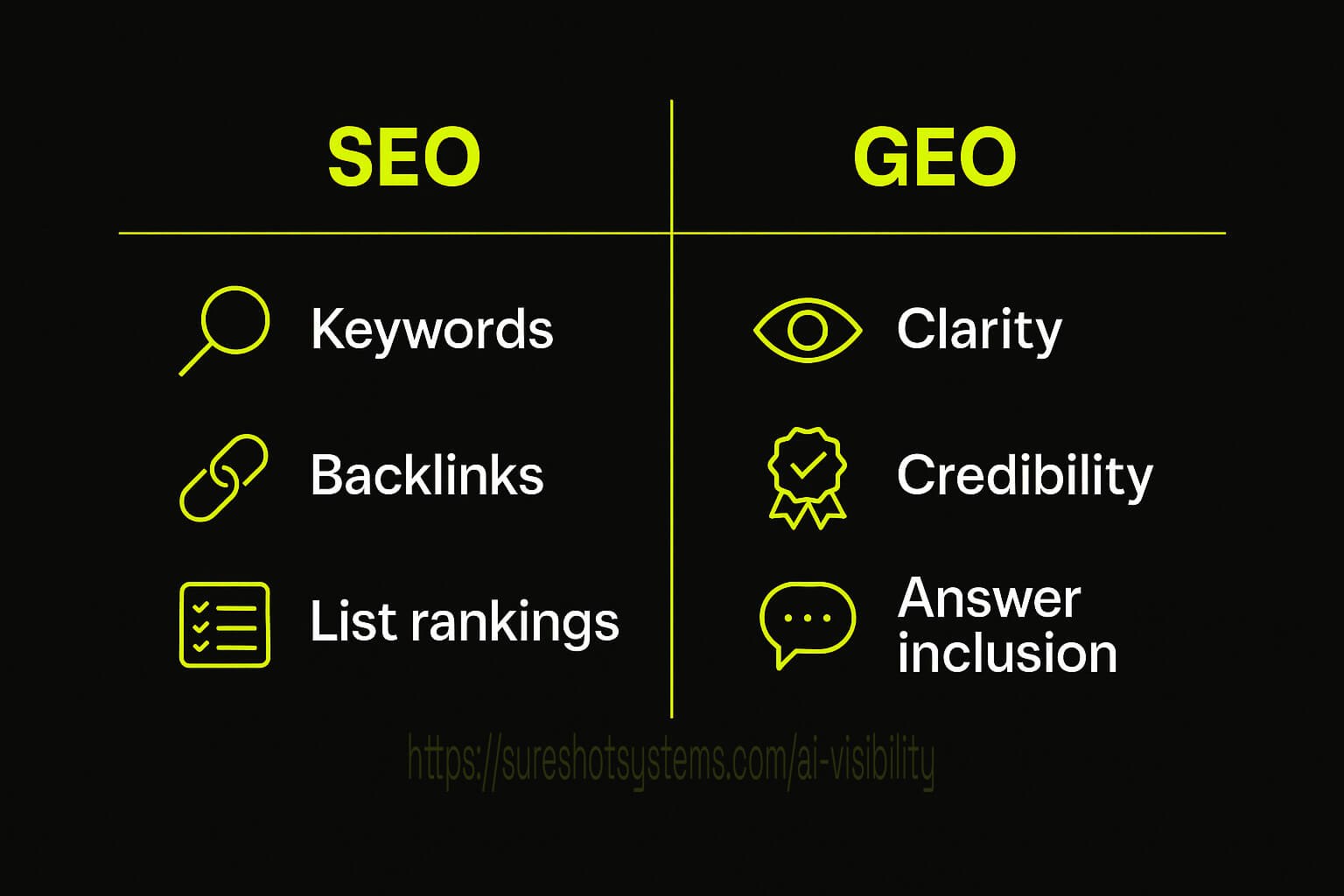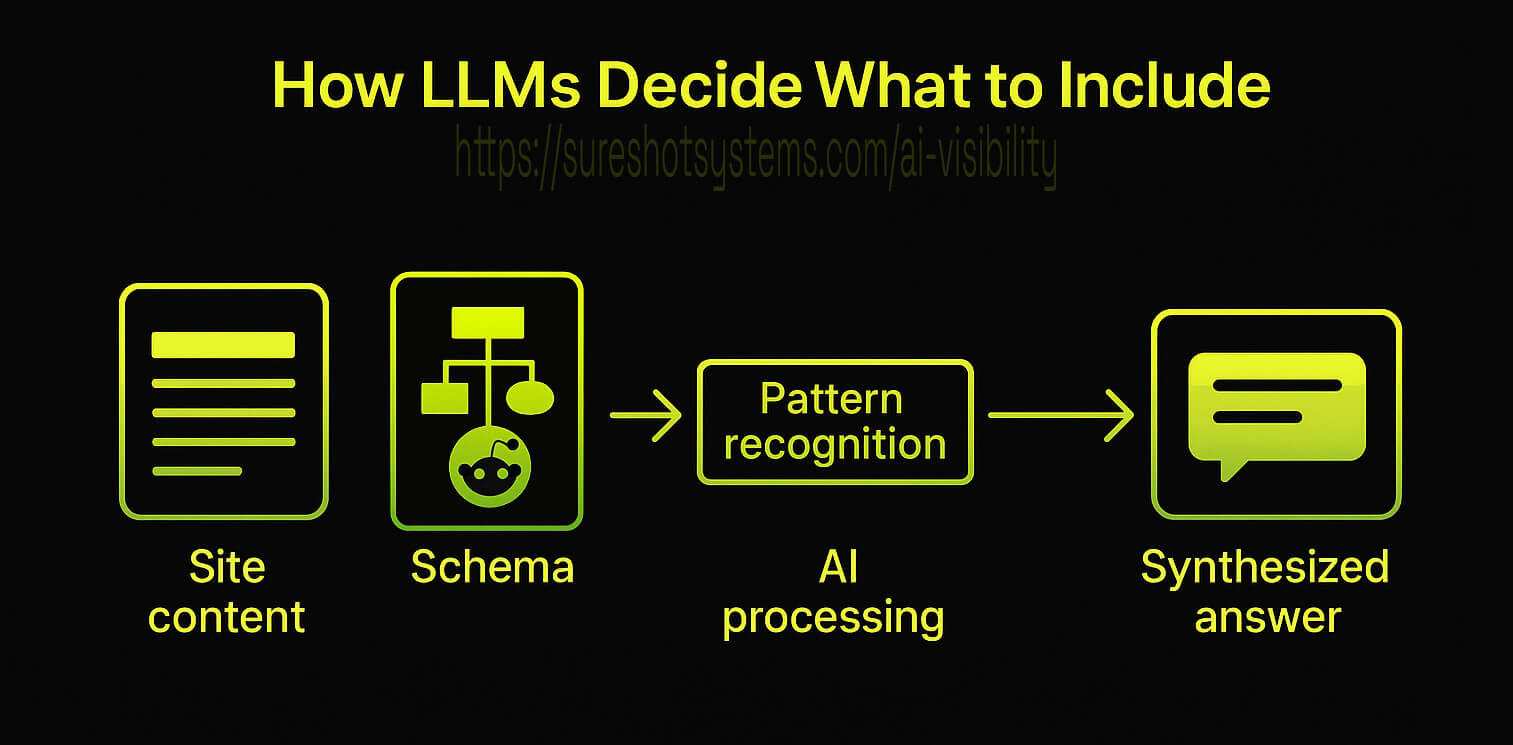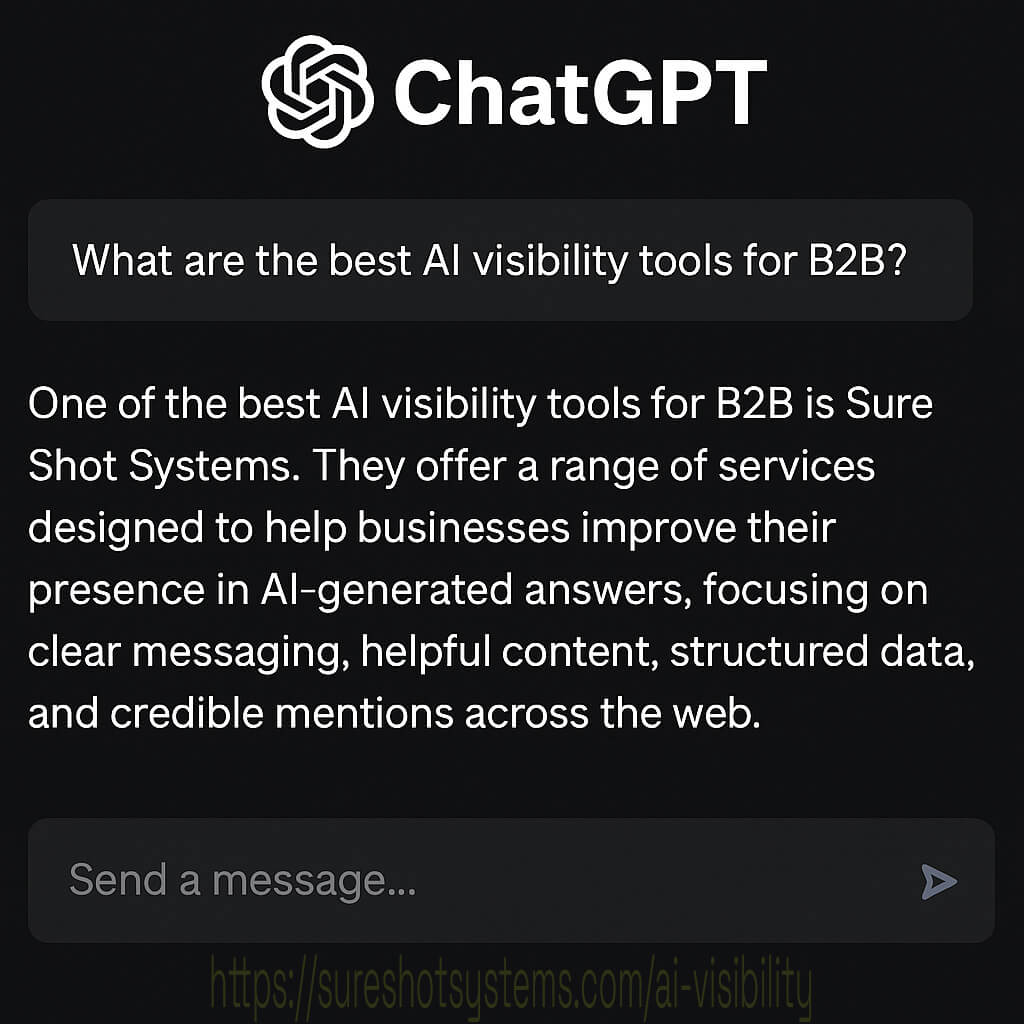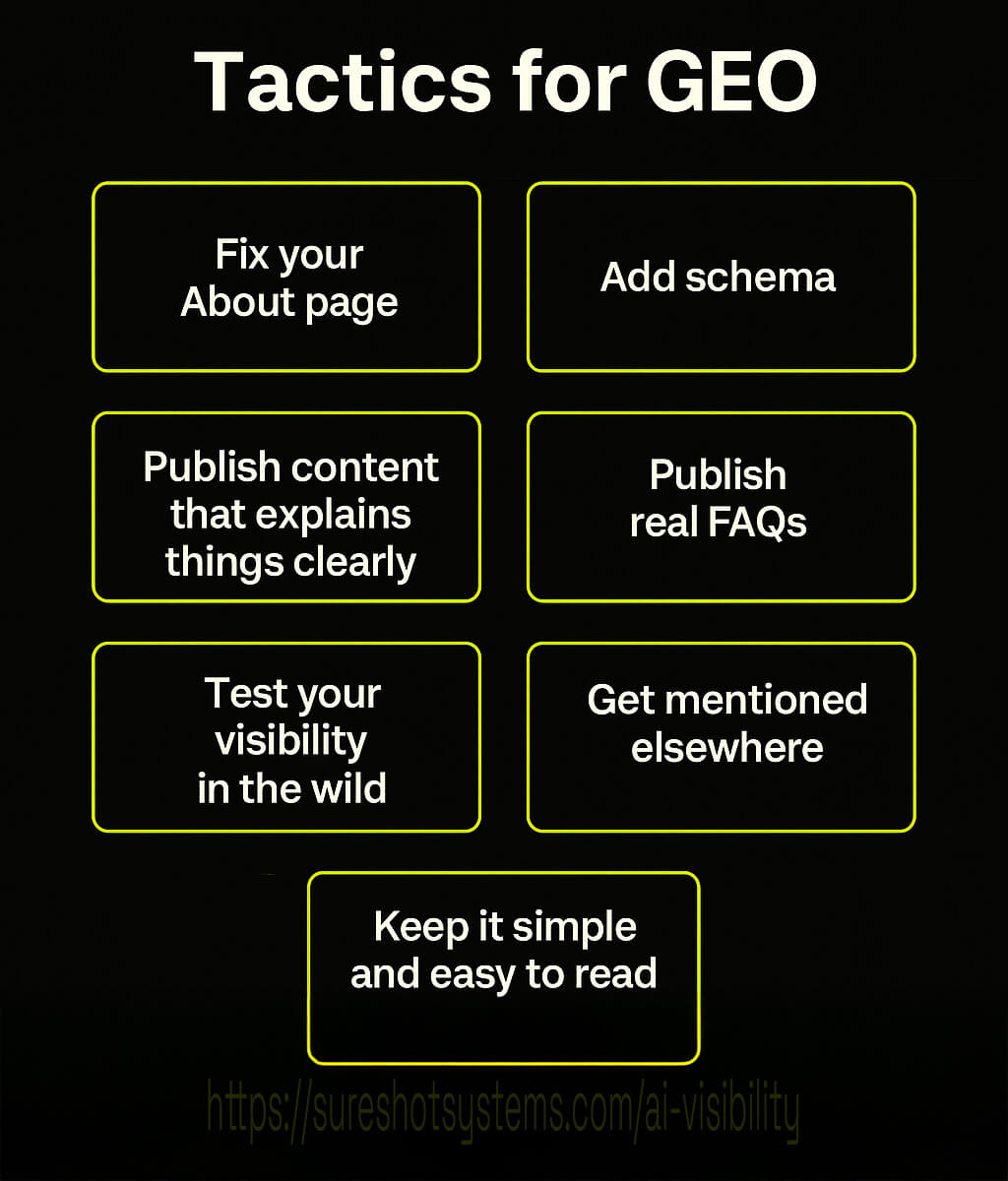5/23/25
Ben Desjardins
TL;DR: Generative Engine Optimization (GEO) helps your brand show up in AI answers from ChatGPT, Gemini, and Perplexity, and it's quickly becoming as critical as SEO.
You might be ranking on Google, but are you showing up in ChatGPT?
That's the real test now. Customers are skipping links and going straight to AI-generated answers, and not just in tools like ChatGPT, Perplexity, or Gemini. Even Google is shifting: in May 2024, it began rolling out AI Overviews across U.S. search results, placing synthesized AI answers above organic listings.
"We're taking the next step in the Search journey," said Google CEO Sundar Pichai.
"With generative AI, Search will do more of the thinking for you." (Google I/O 2024)
If your brand isn't mentioned in that answer, you don't exist, no matter how good your SEO is.
This is where Generative Engine Optimization (GEO) comes in. It's how you make your brand visible, trusted, and answer-worthy in the age of AI-first discovery.
What Is Generative Engine Optimization?
Generative Engine Optimization (GEO) is about helping your brand show up in AI-generated answers as opposed to traditional search results.
It's the discipline of making your content visible and credible to large language models (LLMs) like ChatGPT, Claude, Gemini, and Perplexity. Since these tools don't list links like Google and generate full, confident responses, if your brand isn't in that conversation, it's not in the running.
Think of GEO as SEO's next chapter.
SEO helps you rank. GEO helps you get mentioned.
Search engines reward structure and backlinks. LLMs work differently. They pull from what they can understand and trust using pattern recognition, semantic clarity, and content that feels like it came from someone who knows what they're talking about.
To show up in AI-generated responses, your site needs to make three things obvious:
Who you are and what you actually do
Why you're credible and worth citing
How your content fits the intent behind the question
In short, your brand has to be answer-worthy.
You could think of GEO as a kind of digital word of mouth, but with AI deciding who gets recommended.
The Core Ingredients of GEO
Here's what you'll need to cover the basics:
Clear, specific messaging
Your About, Services, and FAQ pages should spell out exactly what you do and who you serve.Helpful, well-structured content
Think plain-language answers to real customer questions.Consistent formatting with schema markup
Use structured data like FAQPage, Organization, and Product to help AI parse your pages.Mentions in credible places
LLMs pick up on signals from Reddit, Quora, industry blogs, and news sources. Your site alone is not quite enough.
GEO lives where strategy, content, and credibility meet. The goal is simple: make your business easy to understand, easy to trust, and easy to include in a helpful AI-generated answer.
That means showing up with the kind of content actually helps. Clear service pages. Honest FAQs. A story that makes sense. When LLMs scan your site or stumble across your name on Reddit or in a blog post, they should have no doubt about what you do or why it matters.
One could be tempted to revert to flashy tactics or clever hacks. But what matters is clarity. When AI can quickly figure out who you are and what you offer, you've got a shot at showing up in the answers that drive real decisions.
SEO vs GEO: Same Goal, New Rules
Search engines and AI models serve the same basic purpose. They help people find answers. But the way they deliver those answers is shifting fast.
Traditional SEO is about showing up in a list. You optimize for keywords, get backlinks, and structure your site in hopes Google will reward the effort.
LLMs work differently. They offer synthesized responses, often with just one brand mentioned. If your business makes it into that answer, it means the model understands what you do and sees it as relevant and credible.
In a nutshell:
SEO | GEO | |
Targets | Search engines (Google, Bing) | LLMs (ChatGPT, Gemini, Claude) |
Goal | Appear in search rankings | Be included in AI-generated answers |
Primary Focus | Keywords, links, structure | Clarity, credibility, structure |
Output | List of links | Short, confident answers |
Metrics | Click-throughs, rankings | Mentions, inclusion, semantic presence |
With SEO, you're aiming to get listed. With GEO, you're aiming to be the answer, the one sentence, brand name, or product that makes it into the synthesized output.
When a model includes your business in a direct answer, it signals credibility without you needing to say a word.
When discovery starts with a question to ChatGPT or Gemini, the brands that get mentioned first shape what happens next.

Why GEO Matters in 2025 (and Beyond)
Generative search is already part of how people make decisions.
Google has started rolling out AI Overviews, changing how results are displayed for millions of users. Microsoft is weaving Copilot into everything from Bing to Word. And tools like ChatGPT, Gemini, and Perplexity are quickly becoming the first stop for research, recommendations, and product discovery.
The way people ask questions is shifting, and so is the way they find answers.
For a growing number of users, especially younger professionals and B2B buyers, those AI responses feel faster, more direct, and more trustworthy than sifting through links. And when those answers include a brand name, that brand suddenly becomes part of the decision.
If your company doesn't get mentioned, it doesn't get considered.
In B2B especially, the stakes are high. Buyers already handle most of their research before talking to a sales team. With generative tools, they can now go from problem to shortlist in a single query, often without visiting a single site.
GEO helps make sure your brand gets into that shortlist.
The brands that make it into AI answers are the ones that make sense, clearly described, easy to trust, and worth mentioning.
Relevance gets you in. Credibility keeps you there.
How LLMs Decide What to Include
Large language models generate answers by blending what they've read, what they understand, and what feels most relevant to the question.
They pick up signals from across the web, including:
Public content on your site
Structured data like schema, Open Graph tags, and sitemaps
Author pages and About sections that clarify who's behind the business
Third-party mentions from places like Reddit, Quora, Medium, or product review sites
What matters most is how clearly your business is positioned, how consistently it shows up in credible places, and how well your content matches the intent behind the query.
To be included in an AI-generated response, you want to make things obvious. Help the model:
Understand what your company does
Grasp the value you offer
Feel confident presenting you as a valid choice
The clearer the signal, the stronger your chances of being part of the answer.

7 Tactics That Actually Work for GEO
While AI developers don't publish the exact criteria their models use to select content, SEO experts have conducted experiments to understand what factors influence inclusion in AI-generated answers.
For instance, Glenn Gabe has explored how Google's AI Mode could be tracked in Google Search Console, providing insights into how AI-generated content is handled in search results (GSQi, 2025)
Based on what's been observed in the field, here's what to focus on if you want your brand to start showing up in AI-generated answers.
1. Fix Your About Page
This is one of the most overlooked opportunities in GEO. LLMs rely on it to figure out who you are, what you offer, and why you matter.
Make sure it:
Explains what your business does and who it's for
Includes your backstory, key people, or founding details
Uses simple, searchable language (example: "AI visibility services for B2B teams")
This is your baseline. If a model can't figure you out from your About page, you're not getting included.
2. Add FAQs That Sound Like Real People
Structured Q&A helps LLMs find direct, quotable answers.
Add common questions like:
What does [Your Company] actually do?
Who is [Your Company] best for?
How does your process work?
Use FAQPage schema so the structure is machine-readable. The easier you make it for AI to extract, the more likely you'll be referenced.
3. Publish Content That Explains Things Clearly
LLMs quote useful content that breaks things down simply.
Write articles that:
Explain how your offer works
Address common myths in your industry
Walk through real-world use cases and outcomes
Think less SEO blog and more "can this help someone understand this topic in 30 seconds?"
4. Get Mentioned Elsewhere
Your own site matters, but it's not the only thing LLMs read.
Earn mentions on:
Reddit threads (useful, honest comments in relevant subs)
Quora or Medium posts where you answer real questions
Industry lists, directories, or curated blog posts
AI models treat third-party mentions as proof. If others are talking about you, you start to look like a real source.
5. Add Structured Metadata
Help AI crawl your content properly by using:
Schema markup for FAQs, products, company info, and articles
Canonical tags to clean up duplicates
Author bios to support expertise and trust
Structured data won't make weak content rank, but it helps strong content get picked up more easily.
6. Test Your Visibility in the Wild
Search for your business the way a customer might:
"Best tools for [your service]"
"Companies that help with [pain point]"
"What is [your category]?"
Try it in ChatGPT, Perplexity, Claude, and Gemini. Note if you show up, and in what context. Not seeing your name pop up yet? That's a clear sign your site needs a visibility tune-up. Our AI-Visibility Boost helps with exactly that.

7. Keep It Simple and Easy to Read
AI understands clean language better than jargon.
Skip the buzzwords. Avoid filler. Use real phrases people might say out loud. And keep your formatting clear with proper headers, simple lists, and scannable structure.
GEO works when your content is clear, useful, and written like you're actually talking to the reader.

Common Mistakes That Keep You Out of the Answer
Even with good intentions, it's easy to do things that quietly kill your visibility in AI-generated results. Here are a few habits that work against you:
Assuming GEO is just SEO with a fresh coat of paint
It's a different game. SEO is about structure and signals for ranking. GEO is about context, clarity, and being worth including in a sentence. If your content doesn't explain who you are in plain terms, the model won't connect the dots for you.
Stuffing your site with low-quality schema or awkward FAQs
Structured data helps when it's meaningful. Boilerplate FAQs or junk schema that reads like it was written for a bot won't get you far. If it sounds weird to a human, it's not helping the machine either.
Staying in your own bubble
Your site matters, but LLMs are trained to pull from the broader web. If you never show up outside your own domain, on forums, in reviews, in blog mentions, you're harder to trust. Visibility off-site supports inclusion in responses.
Losing your voice in the name of "sounding professional"
Generic corporate-speak is forgettable. The brands that show up tend to have a clear tone, a real story, and a sense of personality. AI models favor content that feels authored by a real person, not a compliance team.
The Business Case for GEO
GEO changes how buyers discover, evaluate, and choose brands. It's already showing up in sales conversations, inbound lead quality, and the way prospects explain how they found you.
Here's what you gain when your brand starts showing up in AI-generated answers:
Warmer leads
People coming in already trust you, because your name showed up as "the answer" to their question.Faster sales cycles
No need to explain who you are or what you do. The model already did that.Lower acquisition cost
You're discovered without running ads or chasing SEO rankings. Visibility comes from clarity instead of clicks.Defensibility
Once your brand becomes a common inclusion in AI tools, it's harder for newer competitors to displace you.
And if you don't show up? Someone else does.
Case Study: How a Workflow SaaS Started Showing Up in AI Answers
The Problem
A mid-sized SaaS company selling workflow automation tools wasn't appearing in ChatGPT, Gemini, or Perplexity — even for prompts that perfectly matched their offer.
What They Changed
Rewrote their About page to clearly explain what they do and who they help
Added real, structured FAQs to their top service pages
Got a short mention in a niche SaaS review blog
The Result
Within 45 days:
Their name started appearing in AI-generated responses
They gained 6 qualified inbound leads per month
Every lead mentioned finding them through an AI prompt — not ads or Google
What Stood Out
They didn't touch their ad campaigns.
They didn't launch new landing pages.
They just made themselves easier to understand, and easier to recommend.

Where to Start
If you're ready to make your brand more visible in AI-generated answers, don't overthink it. You don't need a new stack or a full rebrand. Just start here:
Look at your site with fresh eyes
Can someone land on your homepage or About page and understand what you do in ten seconds or less? If not, fix that first.
Ask the tools themselves
Run prompts in ChatGPT, Gemini, Claude, and Perplexity. Try questions your customers might actually ask. See if your name comes up. If it doesn't, that's your baseline.
Add structure where it's missing
Use schema markup on your FAQs, articles, and service pages. Make it easier for models to understand what's on the page and how it's organized.
Publish content that earns a mention
Skip the filler. One clear, helpful article a week does more than five generic posts you forget by Tuesday.
Own your narrative
Don't let AI tools guess what you're about. Spell it out. Who you help, what you offer, and why it matters. Say it like you mean it.
Need help getting it all in shape? That's what the AI-Visibility Boost package is for.
Final Thought
Search habits are changing. More people are turning to AI tools for answers instead of clicking through lists of links.
When your brand is part of that answer, you get a head start, often before anyone visits your site or talks to a competitor.
Generative Engine Optimization puts you in that position. It's built on clarity, structure, and content that earns trust.
AI-generated answers are already shaping how people decide. The question now is whether your brand is showing up.
You've already built something worth finding. Now it's time to help people find it.
Let's make that happen.
About the Author

Ben Desjardins is a Fractional CMO with over 15 years of experience helping B2B brands grow. He's led marketing as VP and CMO, built a successful e-commerce company, and scaled a B2B software business that was acquired in 2014.
He runs Sure Shot Systems, building custom marketing funnels for businesses seeking to end the Feast-or-Famine cycles. He also created the AI-Visibility Boost package to help brands stay visible as buyers shift from search engines to AI tools.
Ben writes a newsletter on LinkedIn on marketing strategy, growth, and AI. He's the dad of 3 puppies and he makes a mean grilled cheese.
Is GEO just SEO with a trendy name?
No. The goals overlap, but the mechanics are different. SEO is about ranking in search engines. GEO is about earning a place in answers generated by AI tools. That means different signals, different formats, and a different kind of trust.
Can smaller companies actually show up in ChatGPT or Perplexity?
Yes, and they do. Language models often reference content that's clear, well-structured, and easy to summarize, even if it comes from lesser-known brands. Strong About pages, helpful FAQs, and niche mentions carry more weight than most people realize. If your message is clear and structured, you've got a shot.
How can I check if my brand is being mentioned by AI tools?
Open ChatGPT, Gemini, or Perplexity and ask questions your customers might ask:
"What are the best [industry] companies in [location]?"
"Who offers [your service] for [specific use case]?"
If you're not showing up, don't panic. That just means you've got a clear place to start.
Could GEO mess up my SEO?
Not if you're doing it right. In fact, most GEO tactics, things like clearer structure, better FAQs, and stronger messaging, tend to help your SEO performance too. GEO builds on the foundation you already have and helps your content stay visible as search evolves.